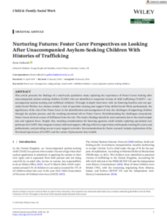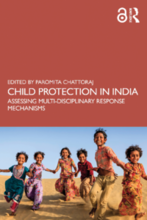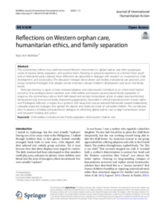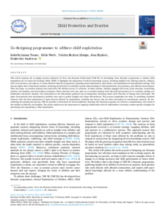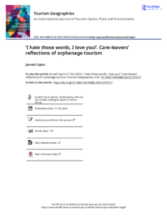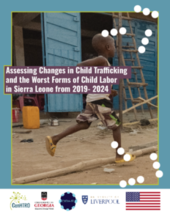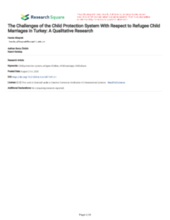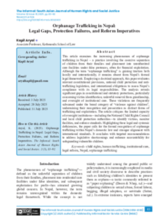Displaying 1 - 10 of 470
This article explores the experiences of foster carers supporting unaccompanied asylum-seeking and trafficked children (UASTC) in the U.K., highlighting challenges such as limited specialist training, the emotional toll of managing risk, and navigating the asylum process. Despite the small sample, findings suggest the need for trauma-informed care pathways, tailored training and supervision, peer support networks, and further research into UASTC experiences across different placements.
This book offers a comprehensive exploration of the institutional, legal, and social frameworks surrounding child protection in India. Anchored in a multidisciplinary approach, the book brings together insights from law, social work, psychology, education, and public policy to examine how various systems interact in addressing the issues related to protection of children from abuse, neglect, trafficking, and exploitation.
This commentary critiques Western-led global orphan care interventions, arguing that donor-driven aid, institutionalization, and voluntourism often perpetuate trauma, family separation, and an “orphan economy” despite good intentions. Drawing on lived experience, research, and ethical reflection, it calls for trauma-informed, family-preserving, and culturally respectful approaches that prioritize children’s rights, dignity, and long-term wellbeing.
This article examines how Terre des Hommes Netherlands used a participatory co-design process to develop thematic programmes addressing sexual exploitation, child labour, and exploitation in humanitarian settings as part of its Listen Up! Strategy (2023–2030). By integrating insights from research, children, staff, and local partners through workshops, storytelling, and problem analysis, the process combined academic knowledge with lived experiences to create context-specific, evidence-informed interventions and Theories of Change.
This study explores the experiences of nine young Thai adults who grew up in a Christian orphanage supported by foreign volunteer tourists, highlighting the impact of these visits on the children. Findings reveal that while orphanages often used children to attract financial support, most volunteers provided fleeting attention, leaving children disappointed and vulnerable, emphasizing the need for orphanage models that prioritize the children’s needs over tourist interests.
This endline report reviews changes in child trafficking and child labor across four districts in Sierra Leone between 2019 and 2024, drawing on both quantitative and qualitative data. It summarizes major findings, outlines key recommendations, and provides an overview of the study’s methodology and program phases from baseline to endline.
This study examines the challenges faced by child protection professionals in Turkey when addressing refugee child marriage, highlighting issues in identification, assessment, and residential care due to cultural acceptance and systemic weaknesses. The findings emphasize the need for culturally informed, system-wide interventions to better protect at-risk refugee children.
This article examines the increasing phenomenon of orphanage trafficking in Nepal – a practice involving the coercive separation of children from their families and placement into unauthorized care facilities under false pretences, often for financial exploitation. It evaluates relevant constitutional provisions, national child protection and anti-trafficking legislation, and international obligations to assess Nepal’s compliance with its legal responsibilities.
Positioned as ethical travel, orphanage tourism commodifies vulnerable children, akin to slum and wildlife voluntourism. Rather than alleviating harm, it sustains institutionalisation and exploits children for profit. This article examines orphanage tourism through hospitality ethics, sustainable tourism and corporate social responsibility (CSR), revealing gaps in hospitality curricula that overlook the industry’s complicity.
This report provides a comprehensive overview of global and regional child labor trends. The publication profiles children engaged in child labor, maps where these practices are most concentrated, and examines the critical impact on children’s access to education and learning outcomes.

